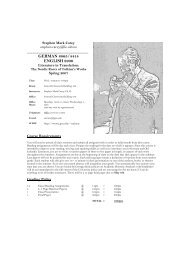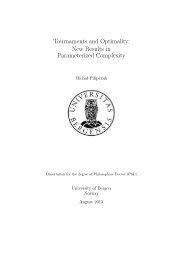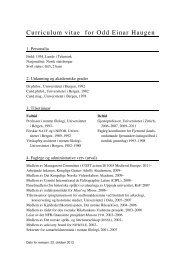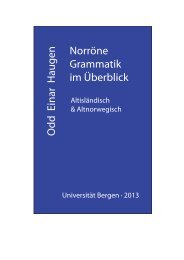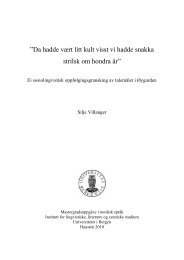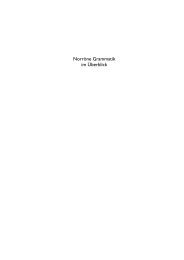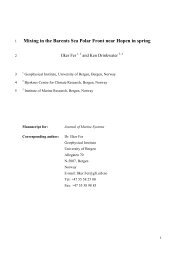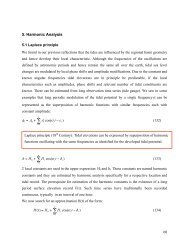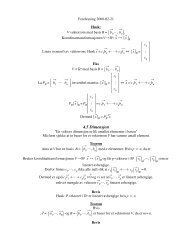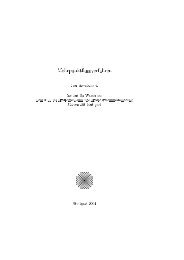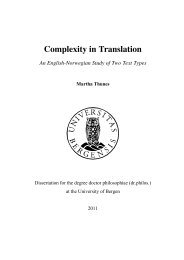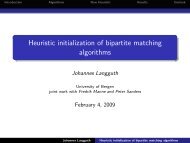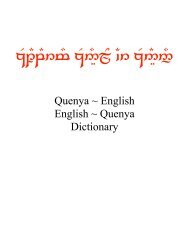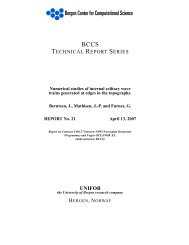education…….
education…….
education…….
You also want an ePaper? Increase the reach of your titles
YUMPU automatically turns print PDFs into web optimized ePapers that Google loves.
Some Challenges for Science Education<br />
(Why don't they love us any more?)<br />
Outline<br />
Svein Sjøberg, Oslo and Copenhagen University<br />
svein.sjoberg@ils.uio.no -- http://folk.uio.no/sveinsj/<br />
Science (and math) educations as academic fields<br />
International comparisons: Learning from others, or..?<br />
Crisis??<br />
Knowledge: Falling level?<br />
Problematic attitudes and interests?<br />
Disenchantment and disillusionment?<br />
Possible explanations: not (only) in schools, but in<br />
Society:<br />
Changes in the life worlds of the young<br />
Changes in science and its relationship to society<br />
1<br />
2
"Science Education"<br />
An interdisciplinary bridge! (Falling between chairs?)<br />
Science<br />
Science Education<br />
"Naturwissenschaftliger<br />
Didaktik" etc…<br />
Education<br />
Academic Identity:<br />
(Natural) science or social science?<br />
Problematic: "Didaktik" vs<br />
Didactics: "Didactical: Moralistic ..<br />
fond of instructing or advising others:<br />
tending to give instruction or advice,<br />
even when it is not welcome or not<br />
needed"<br />
Loyalty:<br />
Theory or practice?<br />
Academia or schools?<br />
Basic questions of<br />
'Didaktik':<br />
Why? What? How?<br />
(and for Whom?)<br />
Science Education<br />
Possible perspectives -- sources for theory and reflection:<br />
History of science and<br />
The history of School Science<br />
Philosopy and<br />
epistemology of science<br />
Sociology of Science<br />
(National) Science curriculum<br />
Science content:<br />
as research,<br />
as a discipline of study<br />
and as a school subject<br />
Science<br />
Education<br />
General, National curriculum<br />
Educational psychology<br />
(cognitive, motivational etc.)<br />
Science Education<br />
General "Didaktik"<br />
and curriculum theory<br />
Theories of language, rethorics,<br />
semiotics and communication<br />
School<br />
history<br />
Educational<br />
philosophy<br />
3<br />
Comparative and<br />
international education<br />
4
Sources of information<br />
Surveys like Eurobarometer (and similar<br />
for other continents)<br />
Large scale comparative studies on<br />
pupils’ achievement (IEA/TIMSS and<br />
OECD/PISA)<br />
Comparative studies on attitudes,<br />
interests, perceptions of science and<br />
scientists (the SAS-study, ROSE)<br />
Educational statistics (UNESCO, OECD)<br />
Science achievement at<br />
school level<br />
Evidence from<br />
large scale comparative<br />
studies<br />
TIMSS and PISA<br />
5<br />
6
International assessments, the history..<br />
IEA established 1959<br />
Torsten Husén, Swedish educator and politician.<br />
Vision: Rational planning and improvement of society<br />
through education, based on research evidence<br />
(Key element of the then dominant Nordic social<br />
democratic rationale)<br />
IEA based in Stockholm, later developed into a<br />
university Institute, and IEA moved to the Netherlands<br />
IEA now: Legally a "Non-profit international society",<br />
raising funds from governments etc.<br />
Members: Governments, universities, research<br />
institutes etc.<br />
IEA Results (FISS, SISS, TIMSS etc.) used by e.g.<br />
OECD<br />
Late 1990s: OECD decided to "make their own",<br />
resulting in PISA, planned to last ….<br />
The IEA/TIMSS-study<br />
TIMSS: Third International Mathematics and<br />
Science Study<br />
Data collections in 1995 and 2000<br />
Three levels: 9 year olds, 13 years and last<br />
year in upper secondary<br />
TIMSS continues ( with T for 'Trends')<br />
Data collection April 2003<br />
7<br />
8
60<br />
40<br />
20<br />
0<br />
-20<br />
-40<br />
-60<br />
Science Achievement and Age<br />
Data from all three TIMSS' populations<br />
Third<br />
Grade<br />
Eight<br />
Grade<br />
Final<br />
Year<br />
Sweden<br />
Norway<br />
USA<br />
Gender difference in science score over time<br />
50<br />
45<br />
40<br />
35<br />
30<br />
25<br />
20<br />
15<br />
10<br />
5<br />
Kjønnsforskjeller i naturfag: Utvikling over tid<br />
(Forskjellene er gitt i prosent av standardavviket)<br />
Norge<br />
Sverige<br />
Internasjonalt<br />
0<br />
FISS SISS TIMSS<br />
Norway<br />
New Zealand<br />
Canada<br />
USA<br />
Australia<br />
Netherlands<br />
Czech Republic<br />
Sweden<br />
France<br />
9<br />
10
PISA (OECD): Programme for<br />
International Student Assessment<br />
Reading literacy<br />
Mathematical literacy<br />
Scientific literacy<br />
Cross-Curriculum Competencies<br />
(CCC)<br />
PISA hvert tredje år<br />
med ulike fokusfag<br />
Fase 1 i 2000: Lesing<br />
Fase 2 i 2003: Matematikk<br />
Fase 3 i 2006: Naturfag<br />
Alle tre fag med hver gang for å kunne<br />
måle utvikling over tid<br />
11<br />
12
PISA 2000<br />
International<br />
results in<br />
science<br />
The graph indicates:<br />
Means,<br />
50 % percentiles,<br />
95 % percentiles<br />
Land Gj. snitt<br />
St.<br />
avvik<br />
Korea 552 81<br />
Japan 550 90<br />
Finland 538 86<br />
Storbritannia 532 98<br />
Canada 529 89<br />
New Zealand 528 101<br />
Australia 528 94<br />
Østerrike 519 91<br />
Irland 513 92<br />
Sverige 512 93<br />
Tsjekkia 511 94<br />
Frankrike 500 102<br />
Norge 500 96<br />
USA 499 101<br />
Ungarn 496 103<br />
Island 496 88<br />
Belgia 496 111<br />
Sveits 496 100<br />
Spania 491 95<br />
Tyskland 487 102<br />
Polen 483 97<br />
Danmark 481 103<br />
Italia 478 98<br />
Liechtenstein * 476 94<br />
Hellas 461 97<br />
Russland * 460 99<br />
Latvia * 460 98<br />
Portugal 459 89<br />
Luxemburg 443 96<br />
Mexico 422 77<br />
Brasil * 375 90<br />
PISA2000, Gender differences<br />
60<br />
50<br />
40<br />
30<br />
20<br />
10<br />
0<br />
-10<br />
-20<br />
Lesing Naturfag Matematikk<br />
Naturfagskåre<br />
Norge<br />
Sverige<br />
Danmark<br />
Finland<br />
Island<br />
OECD<br />
13<br />
14
International comparisons --<br />
The political context:<br />
Internationalization and globalization<br />
International cooperation (and<br />
competition!)<br />
Education as a driving force in economical<br />
development<br />
Education as a commodity, the world as a<br />
market<br />
Key words from techno-economical jargon:<br />
transparency, efficiency, accountability etc<br />
Hence: the need for comparisons,<br />
indicators and benchmarks<br />
International comparisons:<br />
Two (incompatible?) perspectives<br />
To open up for diversity…<br />
Open for new visions, new alternatives, promote<br />
critical discussions, give new ideas for<br />
experimentation, learning from others …<br />
To narrow down, to converge…<br />
Establishment of 'universal standards' and<br />
benchmarks for contents, aims and<br />
assessment methods<br />
Give authority to narrow definitions of quality and<br />
efficiency by focussing on quantifiable<br />
aspects.<br />
Focus on technocratic utility<br />
15<br />
16
TIMSS and PISA:<br />
The political context<br />
Government-driven and financed, often<br />
placed in MOEs or commissioned to<br />
special institutes, often with psychometric<br />
(and not educational?) expertise<br />
Better funded than all other educational<br />
research<br />
Grants are commissioned and not<br />
dependent on research applications<br />
Legitimate aim: Policy-relevant information<br />
on pupils’ achievement, efficiency, use of<br />
resources etc.<br />
"International" studies –<br />
for the rich and by the rich?<br />
TIMSS (2003): 68 countries, mainly the rich..<br />
PISA (2003) = 28 OECD-countries (plus 11 more)<br />
BUT: These studies have implicit effects on the<br />
rest of the world (i.e. 150 other countries):<br />
A normative effect: Defining standards,<br />
perspectives, definitions, aims, contents, testing<br />
methods etc.<br />
Singapore: "Only one thing counts in our schools:<br />
win the race!"<br />
The 'winners' become models and ideals for other<br />
countries!<br />
17<br />
18
Who defines ‘global standards’ …?<br />
TIMSS: Biology without evolution!<br />
TIMSS: Human biology without sexual<br />
reproduction!<br />
Explanation: Main finance from the US?<br />
Avoidance of socio-scientific and (real!)<br />
controversial issues a necessity to become<br />
accepted by funders and stakeholders?<br />
PISA and "real life challenges"<br />
Key PISA words: "real life challenges"<br />
BUT: "real life challenges" of children and<br />
their cultures differ!<br />
The need to identify common items removes<br />
(or trivializes) the contexts from the items<br />
PISA (probably) avoids all controversial socioscientific<br />
issues (the 'real' issues?)<br />
"probably" because:<br />
Secrecy about items make ordinary academic<br />
critique impossible<br />
19<br />
20
PISA as 'norm' and standard<br />
PISA (and TIMSS) measure only<br />
a few aspects of a few subjects!<br />
Rankings on these are accepted by the public<br />
and politicians as a valid measure of the<br />
overall quality of the school<br />
Indirectly:<br />
Ignoring other subjects, ignoring the whole<br />
curriculum,<br />
Redefining and trivializing the purpose<br />
schools!<br />
PISA score:<br />
An skewed (!) measure of quality?<br />
21<br />
22
PISA – the critique<br />
Secrecy – departure from academic ideals of<br />
openness and critique<br />
Experts as bureaucrats – loyalty expected<br />
Lack of transparency, Politically and<br />
educationally<br />
Conclusions have to be taken at face value<br />
No peer review of products – secret items also<br />
after publication<br />
Only two items are published (Ozone and<br />
Semmelweis) Serious critique is raised…<br />
‘Real life contexts' turn out to be uncontroversial,<br />
often historical – and not 'real' issues<br />
TIMSS, PISA and public sphere<br />
Results get War-like headings in<br />
international and national media<br />
Results are presented by prime<br />
ministers and presidents and debated in<br />
Parliaments<br />
Results become key elements in<br />
election campaigns (US, Germany etc.)<br />
Action plans 'to get things right' abound<br />
(millions of £,$ etc. released)<br />
23<br />
24
TIMSS and PISA:<br />
Bad results are Good news! (for some)<br />
'Bad' ranking used as a vehicle to<br />
promote national programmes<br />
Release of large sums of money for<br />
national action<br />
All countries are dissatisfied...<br />
Even Japan had 'bad results' (no more<br />
alone on top!) -- resulting in official<br />
concern about falling standards<br />
PISA:<br />
Enormous Press coverage<br />
German News report<br />
(covering only 2 months)!<br />
750 pages, 200 articles<br />
Similar in other countries<br />
25<br />
26
"PISA Schock"<br />
gives 11 600 hits on<br />
Google!<br />
OECD-Studie PISA<br />
legt deutsche Schul-<br />
Misere bloß<br />
Deutschland im<br />
Bildungsschock.<br />
PISA i Tyskland<br />
27<br />
28
Krigsoppslag over hele<br />
5. desember 2001<br />
"Norway is a school loser"<br />
"- this is sad –like coming home from<br />
the winter olympics without gold<br />
medals.<br />
- and this time we cannot blame the<br />
Finnish success on doping."<br />
(Kristin Clemet, Norway's Minister of Education)<br />
29<br />
30
(But also the Swedes are dissatisfied!)<br />
School performance and spending<br />
per student<br />
The Nordic countries:<br />
31<br />
Inverse relationship!<br />
(Higher spending, lower results!)<br />
32
PISA-TIMSS.<br />
Not just ‘learning from others’<br />
In this country, only one thing matters – be<br />
best, teach to the test!<br />
Helmer Aslaksen, professor in Math, Singapore<br />
…TIMSS researcher … astonished to see the<br />
young Taiwanese marching into the test room with<br />
military discipline, shouting nationalistic slogans.<br />
Times Education Supplement, 26 May 2000<br />
“TIMSS-like” testing is used by donors (like the<br />
World Bank) as condition for funding of education<br />
in developing countries<br />
Conclusions<br />
PISA/TIMSS provides the Ministries with<br />
(legitimate!) information for decisions!<br />
BUT:<br />
PISA is a sign of education becoming<br />
globalized – a pressure to 'harmonize'<br />
education – (like other aspects of society)<br />
Prediction:<br />
Educational Policy in OECD will be "PISAdriven"<br />
in the years to come<br />
There is a need for an informed and<br />
critical debate about uses and potential<br />
misuses<br />
33<br />
34
% Riktig<br />
Lower level, falling standards?<br />
(1)<br />
Yes –<br />
Based on tests and reports from<br />
tertiary S&T institutions.<br />
(But maybe the best students no<br />
longer want to become scientists or<br />
engineers?)<br />
100<br />
90<br />
80<br />
70<br />
60<br />
50<br />
40<br />
30<br />
20<br />
10<br />
0<br />
Falling standards in Mathematics in<br />
higher education? (Norsk Matematikkråd)<br />
68<br />
"På Dahl skole er det 135 jenter og 115 gutter.<br />
Hvor mange prosent er jenter?"<br />
58<br />
55<br />
85<br />
67<br />
Ing Siv.Ing Teachers<br />
64<br />
53<br />
45<br />
1999<br />
2000<br />
2001<br />
33<br />
35<br />
36
Lower level, falling standards?<br />
(2)<br />
No –<br />
There is no evidence for falling<br />
standards available through surveys<br />
on Public Understanding of Science<br />
or from the large scale school<br />
comparative studies.<br />
But we may be very dissatisfied with the<br />
results!<br />
Falling interest in S&T?<br />
Yes– when recruitment (choice of schools subjects<br />
and further studies) is the measure for interests<br />
But: Large variations between different areas of S&T<br />
(life sciences have less problems than e.g. physics!)<br />
No – based on the interest for popular science in<br />
books and magazines and other media, surveys<br />
(Eurobarometer), visits to science centres etc<br />
Conclusion: Recruitment to S&T is the main<br />
challenge to be explained and addressed<br />
In the long run: The lack of qualified science<br />
teachers is more serious that the lack of recruitment<br />
to research and industry!<br />
37<br />
38
SAS: Science And Scientists<br />
Participating countries 2002<br />
USA (2)<br />
Chile<br />
Trinidad<br />
Iceland<br />
Norway (2)<br />
England (3)<br />
Sweden<br />
Spain Hungary<br />
Sudan<br />
Nigeria (4)<br />
Uganda<br />
Mozambique<br />
Lesotho<br />
Russia<br />
India (3)<br />
S-Korea<br />
Japan<br />
Philippines<br />
Papua New Guinea<br />
Australia (2)<br />
10 000 13-year olds in 21 countries<br />
answers, writes, draws…<br />
The image of science,<br />
scientists as persons<br />
(SAS, Science And Scientists, Sjøberg 2002)<br />
From drawings and free writing:<br />
Children in developing countries:<br />
A very positive image<br />
Most children in developed countries also<br />
have a positive image, but a considerable<br />
number have a negative and stereotyped<br />
image of scientists. ('The crazy scientists')<br />
39<br />
40
A scientist at work<br />
Boy from Norway, 13 year (SAS-study)<br />
A scientist at<br />
work<br />
(Boy from Norway, 13<br />
years)<br />
"I think they<br />
experiment<br />
with animals<br />
and kill them.<br />
And then they<br />
develop<br />
poisonous gases<br />
and atomic bombs"<br />
41<br />
42
Girl, Norway<br />
They try to<br />
invent new<br />
things to kill<br />
people or to<br />
help people<br />
Boy, Norway<br />
They research on<br />
things that they<br />
think may help<br />
or destroy the<br />
world.<br />
43<br />
44
Scientists at work: Developing countries<br />
1. They are always thinking<br />
2. They always have ideas<br />
3. They (most) are brilliant<br />
people.<br />
4 They are always making<br />
experiments new discoveries<br />
5. If scientists were not here we<br />
ordinary people wouldn't know<br />
anything. (Girl Trinidad)<br />
Europeans, Science<br />
and Technology<br />
Eurobarometer 55.2 (2001)<br />
(one of many surveys)<br />
New 2003: Including 13 potential<br />
member states<br />
Scientists helps people regain<br />
their health.<br />
They help those that are sick or ill<br />
to get well.<br />
They are fund of discoveries.<br />
They are also kept in the hospital<br />
to take care of those that are not<br />
healthy. (Girl, Nigeria)<br />
S&T related interest and knowledge<br />
Values, science, technology<br />
Responsibilities and accountability of<br />
scientists<br />
GMOs: an important issue<br />
Levels of confidence<br />
45<br />
46
Interest in science and technology<br />
(aggregate, adult population, EU 2001)<br />
Interest in Science and technology (EU 2001)<br />
Germany<br />
Ireland<br />
Portugal<br />
France<br />
The Netherlands<br />
Denmark<br />
Greece<br />
Sweden<br />
29,8<br />
31,6<br />
37,9<br />
58,9<br />
60,9<br />
60,9<br />
64,3<br />
0 10 20 30 40 50 60 70 47<br />
Attitudes to science (EU 2001)<br />
"Science is changing our ways of life too<br />
quickly" Agree: 61.3%<br />
"Scientists' knowledge gives them a<br />
power which makes them dangerous"<br />
Agree: 63.2%<br />
"The authorities ought to formally oblige<br />
scientists to observe ethical rules."<br />
Agree: 80.3%<br />
The more knowledge, the less trust? :<br />
85% agreement among the highest knowledge<br />
group (11 to 13 points on the knowledge index)<br />
54<br />
48
Opinions about scientists<br />
(in situations like BSE, data from EU 2001)<br />
Scientists ought to keep us better informed<br />
about the possible hazards of certain<br />
scientific or technological advances<br />
Agree: 89.0 %<br />
Scientists ought to communicate their<br />
scientific knowledge better<br />
Agree: 86 %<br />
Industry ought to be better regulated<br />
Agree: 82 %<br />
Science versus non-science (% EU15)<br />
For each of the following disciplines, please<br />
indicate whether it appears to you rather<br />
scientific or not very scientific.<br />
100<br />
90<br />
80<br />
70<br />
60<br />
50<br />
40<br />
30<br />
20<br />
10<br />
0<br />
Medicine<br />
92,6 89,5 88,2<br />
Physics<br />
Biology<br />
77,9<br />
Astronomy<br />
72,3<br />
Mathematics<br />
Psychology<br />
64,5<br />
Astrology<br />
52,7<br />
Economics<br />
42,3<br />
History<br />
33,1<br />
49<br />
50
"Genetically modified food<br />
(GMO) is dangerous"<br />
Total for EU: Agree: 56.4 %<br />
Trust in different groups and<br />
occupations (%EU15)<br />
Imagine that there has been a disaster in your<br />
neighbourhood or district. Who would you most<br />
trust to explain the reasons for this disaster?<br />
70<br />
60<br />
50<br />
62,6 59,8<br />
55<br />
40<br />
31,6<br />
30<br />
20<br />
10<br />
0<br />
19,9 17,7<br />
Scientists<br />
Env. protection ass.<br />
Doctors<br />
Consumer associations<br />
Governm ent representatives<br />
Journalists<br />
4,4<br />
Businesses<br />
51<br />
52
The disenchantment with science<br />
– possible reasons<br />
To be understood through social,<br />
political, cultural changes ….:<br />
1. Changes in the life world of the young<br />
2. Changes in science itself,<br />
the image and perceptions of science,<br />
science and its relationship to society<br />
Changes in Society and in S&T<br />
New social role and function of S&T.<br />
Witnesses:<br />
Eric Hobsbawm (historian)<br />
John Ziman (physicist, later science<br />
policy analyst)<br />
53<br />
54
Witness 1:<br />
Eric Hobsbawm:<br />
The historical transition of<br />
science:<br />
From radical, antiauthoritarian<br />
rebel in the pre-war period<br />
To current loyal, conservative<br />
On payroll from Industry and<br />
Military<br />
Acting in the interest of dominant<br />
powers.<br />
Pre-war science: The scientist as<br />
intellectual heros and rebels<br />
Intellectual hero:<br />
"To be a scientist was to be envied.<br />
Certainly those of us who were students<br />
in Cambridge […] knew what we had<br />
wanted to study, if our mathematics had<br />
been good enough."<br />
Radical rebel:<br />
"The typical British scientist of the 1930s<br />
was a member of the (Left-wing)<br />
Cambridge Scientists Anti-War Group …<br />
their distinctions ranged from the Royal<br />
55<br />
56
Changing times, changing<br />
ideologies and commitment…<br />
Some decades later:<br />
"The political temperature of science<br />
dropped after the Second World War.<br />
Radicalism in the laboratories receded<br />
rapidly… "<br />
The generous support of governments<br />
and large corporations encouraged a<br />
breed of researchers who took their<br />
paymaster's policies for granted and<br />
preferred not to think about the wider<br />
implications of their work especially<br />
Witness 2:<br />
John Ziman:<br />
Thee narrow specialization of<br />
scientists<br />
The (increased) need for ethics and<br />
social responsibility<br />
Eroding ethos and ideal?<br />
Farewell to scientific objectivity?<br />
• From critical, radical and<br />
antiauthoritarian –<br />
to accepting, conservative and<br />
complacent<br />
Transition from academic to postacademic<br />
science<br />
57<br />
58
From academic to post-academic science<br />
(based on Ziman)<br />
Academic<br />
Post-academic<br />
Development of ideas<br />
and theories<br />
Intellectual ownership<br />
Search for Truth<br />
(Often not useful..)<br />
Openness, Debate and<br />
Communication<br />
Critical, radical and<br />
antiauthoritarian<br />
Independent intelligentia<br />
Funding of<br />
research in<br />
the US …<br />
Development of products<br />
and patents<br />
Material ownership<br />
Search for practical<br />
Solutions (to predefined<br />
problems) Silence, Secrecy and<br />
Espionage<br />
Accepting, conservative<br />
and complacent<br />
Dependent and loyal<br />
payroll worker<br />
59<br />
60
"Brave new science?"<br />
The changing image of science<br />
Big Science, techno-science<br />
(NASA, CERN, HUGO..)<br />
Over-national and<br />
multinational<br />
Governed by 'external'<br />
forces: economy, politics,<br />
military, industry …<br />
Efficient lobbies for ever<br />
increasing budgets…<br />
'Science: Single-minded pursuit of money' (Greensberg 2002)<br />
The ambitions of Science<br />
(Fascinating for some – frightening for others?)<br />
Biology<br />
Gene manipulation,<br />
babies by design? etc<br />
Physics:<br />
The Theory Of Everything:<br />
The World formulae!<br />
The hunt for<br />
"The God Particle"<br />
61<br />
62
Ambivalence:<br />
The two faces of<br />
science<br />
The Crisis is declared:<br />
"Physics On Stage"<br />
(CERN, ESA, ESO, supported by the EU)<br />
"… recent surveys show a frightening decline of<br />
interest in physics and technology among<br />
Europe's citizens, especially schoolchildren.."<br />
(POS Press release)<br />
"… a progressively deteriorating state of physics<br />
literacy among the European population at all<br />
levels."<br />
(POS, Project document)<br />
63<br />
64
The Crisis? Conclusion<br />
Recruitment to S&T is the main challenge<br />
to be explained and addressed<br />
In the long run: The lack of qualified<br />
science teachers is more serious that the<br />
lack of recruitment to research and<br />
industry!<br />
Avoidance of S&T subjects and<br />
Lack of recruitment<br />
The perceived "Culture of science" turns people<br />
on or off<br />
"The body language of science": Ideologies and<br />
images conveyed by science texts -- and by<br />
scientists<br />
Perceptions of scientists as persons -- their values,<br />
their 'world-view' etc. Some are attracted -- some<br />
are not!<br />
The issue is not (mainly) cognitive, but affective,<br />
personal and social.<br />
This is not just a matter of better understanding of<br />
the concepts and more efficient teaching methods<br />
65<br />
66
Solutions: The contents and framing of<br />
the science curriculum<br />
Not a 'given' -- open for negotiations and<br />
change -- different stakeholders<br />
Key concern for a radical reworking:<br />
Re-establish relevance, meaning,<br />
significance<br />
Based on Changes in<br />
1. Science, technology and their role in society<br />
2. The social and personal life-worlds of the young<br />
(changing values, concerns, interests, priorities,<br />
hopes and aspirations ..)<br />
Scientific and technological literacy<br />
(Bildung, dannelse, bildning, formation…)<br />
Key idea:<br />
To combine respect and admiration<br />
for S&T with critical distance<br />
1. Appreciate S&T as cultural and human products,<br />
and their key place in our human heritage<br />
2. Be familiar with key ideas in a scientific worldview<br />
and some elements in their historical<br />
development<br />
3. Appreciate the possibilities of S&T -- and to<br />
realise the limitations and potential side effects<br />
4. Be able to balance scientific arguments against<br />
social, political and moral perspectives in<br />
contemporary socio-scientific issues<br />
67<br />
68
Trends in science curriculum reforms (1)<br />
Widening the perspective: Key slogans:<br />
"Science for all", "Science for Citizenship"<br />
etc.) ('dannelse', 'Bildung etc')<br />
Towards subject integration, problem- and<br />
issue-orientation<br />
More weight on technology and applications<br />
Concern for the Environment<br />
STS: Science, Technology and Society<br />
Inclusion of ethics<br />
Inclusion of Controversies and Socio-scientific<br />
dilemmas<br />
Balancing authoritarian and established 'textbook<br />
science' with contemporary, contested<br />
research frontier<br />
Trends in science curriculum reforms (2)<br />
More weight on The Nature Of Science<br />
Scientific knowledge as culture and a human<br />
construction<br />
Interplay between observations and theory<br />
Science as public argumentation<br />
Scientific knowledge as fallible (but the best we<br />
have..)<br />
Putting Science in Contexts (personal, social)<br />
"Less is more": Abandoning the encyclopaedic<br />
and overcrowded curriculum)<br />
Implications of Uncertainties -- living in a "Risk<br />
society"<br />
"The narrative turn". Great Stories of Science<br />
69<br />
70
Telling stories: The narrative turn<br />
Weight on Great Stories with meaning and relevance.<br />
Meanings to be enjoyed and remembered.<br />
(Also recommended in "Beyond 2000")<br />
Examples of Science in recent literature.<br />
The play "Copenhagen", books like "Galieos<br />
daughter", bestsellers like E = mc 2 are examples<br />
Parallels to Jostein Gaarders "Sophie's World" (A<br />
personal story of philosophy, world-wide best-seller)<br />
"Stories" also as science texts for school science.<br />
Hunt and Millar: Science for Public Understanding<br />
(Nuffield 2000)<br />
The contrast, (the 'normal'?) follows …<br />
Science for all?<br />
The last dose of obligatory science:<br />
Concepts in one of 12 chapters in (typical) Norwegian textbook<br />
age 16.<br />
kromatin, kjernelegeme, kjernemembran, ER,<br />
endoplasmatisk retikulum, endoplasmatisk nettverk,<br />
vakuole, mitokondrium, ribosom, kloroplast, endosom,<br />
golkiapparatet, lysosomer, plasmid, cellevegg, vakuoler,<br />
fosfolipid, fosfsorsyre, semipermeabel membran, osmose,<br />
endocytose, lysosomer, aminosyrer, transportbærer,<br />
eksocytose, signalstoffer, monosakkarider, ploysakkarider,<br />
DNA, deoksyribonukleinsyre, deoksyribose, adenin,<br />
cytocin, guanin, tymin, gener, kromosomer, mitose,<br />
homolog, diploid, kromatider, søsterkromatider, meiose,<br />
haploid, CGA, CTC, TAC, human genom, ribosomer,<br />
cytoplasma, RNA, ribonukleinsyre, uracil, m-RNA,<br />
messenger RNA, t-RNA, pigmenter, klorofyll, glukose,<br />
cellulose, plasmider, enzym, substrater, fenylketonuri,<br />
denarere, ATP, ADP, AMP, edenisintrifosfat, -difosfat og<br />
monofosfat, pyrodruesyre, aerob celleånding, anaerob<br />
celleånding (med formler) …<br />
71<br />
72
Summary and Conclusions<br />
Current problems have an objective basis in changes in<br />
S&T and the life-world of the young<br />
Science curricula (and science teacher education!) are<br />
in need for fundamental debates over meaning and<br />
relevance<br />
Complicated issues require a variety of perspectives and<br />
approaches<br />
The affective dimensions is the key to grasp the<br />
problems of S&T education.<br />
Critiques of S&T (cultural, political, feminist) should be<br />
taken seriously<br />
S&T should be legitimised with concepts like "culture,<br />
empowerment, education for democracy, critical<br />
thinking"<br />
Changes in arguments must be accompanied by<br />
changes in contents and practice!<br />
Scientific and technological literacy<br />
(dannelse, bildning) is to…<br />
5. Understand (and critically judge) contemporary<br />
criticism of S&T<br />
6. Be able to distinguish between scientific and quasiscientific<br />
arguments<br />
7. Be able to use and benefit from scientific methods,<br />
values and attitudes where they are applicable -and<br />
not to use them when they are out of place<br />
8. Be critical and constructive to the role and ambitions<br />
of S&T in present society<br />
9. Be able to express an informed view on how<br />
Scientific research should be prioritised and<br />
governed -- when this is needed…<br />
73<br />
74
Official EU policy statements<br />
"The Lisbon declaration" (2001):<br />
At 2000 the European Summit of Lisbon heads of states<br />
committed themselves to transform Europe into "the<br />
most competitive and dynamic knowledge-based<br />
economic and cultural region in the world by 2010."<br />
"The Barcelona target" (2002):<br />
….an increase of the proportion of European GDP<br />
related to research from 1.9% to 3%.<br />
"Action plan" (2003):<br />
"Young people lack interest in pursuing scientific studies<br />
and careers: classroom courses and studies appear<br />
poorly adapted …, and perceptions of …. science-based<br />
professions appear to be negative.<br />
Europe needs more scientists not less."<br />
EU's Science and Society"<br />
Part of Frame Programme 6, FP6 (launched<br />
Nov 2002) http://www.cordis.lu/rtd2002/<br />
The Science and Society Action Plan<br />
proposes a range of initiatives, along three<br />
directions:<br />
1. promoting education and science culture in<br />
Europe;<br />
2. bringing science policy closer to the citizens;<br />
3. responsible science for policy-making.<br />
http://www.cordis.lu/rtd2002/science-society/<br />
75<br />
76
New initiative:<br />
Increasing the participation..<br />
Science and technology are key factors in national<br />
development<br />
Europe needs 500 000 new scientists in 10 years…<br />
Busquin established “High Level Group” to produce action<br />
Headed by Gago, rapporteur: John Ziman<br />
Now. Letters to Ministers, organizations etc.<br />
Report and analysis undertaken for Report<br />
Workshop on Report in December<br />
Conference in April 2004.<br />
Then implementation of actions…<br />
The current 'crisis' represents a challenge -- as well as<br />
an obvious possibility for Science educators in Europe<br />
Information and studies:<br />
TIMSS (continues, with T for Trends) http://timss.bc.edu/<br />
OECD's PISA (continues for at least 10 years, focus on<br />
science in 2006) http://www.pisa.oecd.org/<br />
Science And Scientists (SAS-study), and the emerging<br />
ROSE: Relevance of Science Education) (ref:<br />
svein.sjoberg@ils.uio.no<br />
Eurobarometer 55.2 "Europeans, Science And<br />
Technology" http://europa.eu.int/comm/dg10/epo/eb.html<br />
and Candidate countries Eurobarometer (CCEB) 2003<br />
http://europa.eu.int/comm/public_opinion/<br />
UNESCO: World Education Report and statistics<br />
http://www.unesco.org/<br />
OECD: Education at Glance http://www.oecd.org/<br />
UNDPs Human Development Reports http://www.undp.org/<br />
EU's 6th Frame Programme, now with Science and<br />
Society action plan http://www.cordis.lu/rtd2002/sciencesociety/<br />
77<br />
78



